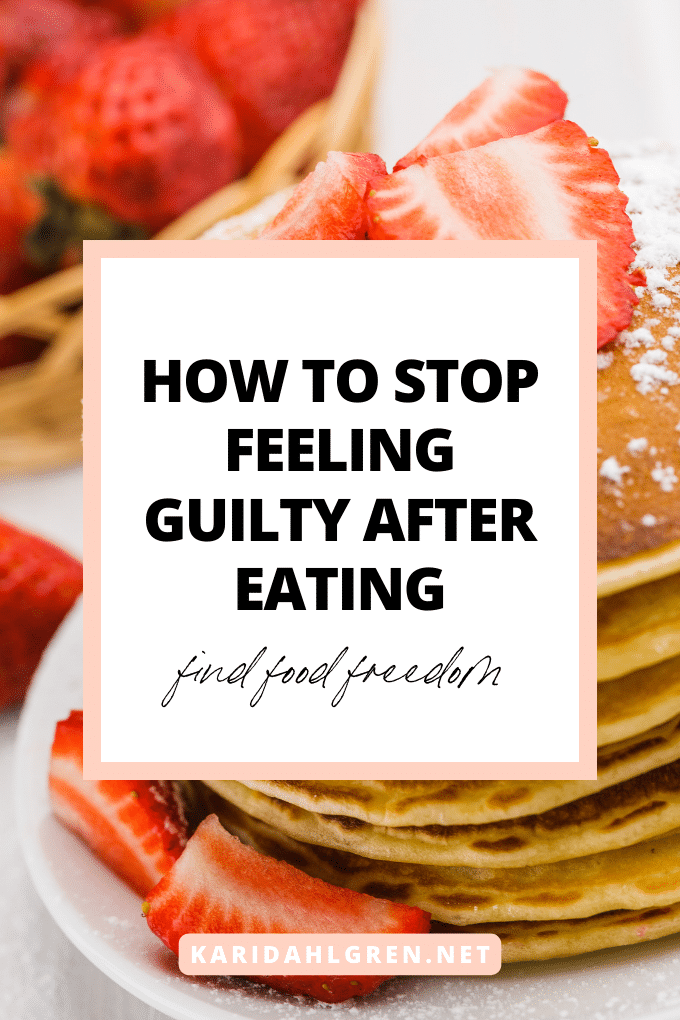
Have you ever felt a pang of guilt after indulging in a slice of chocolate cake or a bag of chips? If so, you’re not alone. The phenomenon of feeling guilty after eating, also known as food guilt, is a common experience for many.
Food guilt is a learned experience. When you think about it, small children don’t struggle with feeling guilty after eating. A very young child eats when hungry and stops when full without any extra judgments. While diet culture has instilled food guilt in many of us, the good news is that it can be unlearned.
You’re about to learn why feelings of guilt after eating are pervasive in today’s culture, why you’re normal if you feel this way, and how to get back to eating without the burden of shame and guilt.
Diet Culture Is at the Epicenter of Feeling Guilty After Eating
At the heart of food guilt lies diet culture, a pervasive system of beliefs that promotes thinness and equates it with health and moral virtue. Diet culture instills a black-and-white thinking about food—just look at pop culture bestsellers like Eat This, Not That. The dichotomy of ‘good’ and ‘bad’ foods leads to the moralization of food choices, and perpetuates the restrict-binge cycle.
When certain foods or overall energy intake is restricted, it’s normal to become preoccupied with (i.e. always thinking about) those off-limits items.[1] This can lead to overeating or even binge eating episodes.[2] When the intention is to eat less but the result is eating more, it can intensify feelings of shame and guilt after eating.
The cycle doesn’t stop there, either, as diet culture convinces us that guilt and shame are great motivators for making better food choices later on—but this simply isn’t true. One study found that individuals who felt guilty after eating typical forbidden foods did not report more positive attitudes or stronger intentions to eat healthily.[3]
Why Do I Feel Guilty After Eating? Finding Self-Understanding & Compassion

People that struggle with yo-yo dieting deserve enormous compassion, and self-understanding helps pave the way. Before we unpack the steps for relearning how to not feel guilty after eating, it’s important to get a clear picture of why food guilt emerges to begin with. If you’re constantly asking yourself, “Why do I feel guilty after eating?” I hope these evidence-based answers inspire deeper self-understanding and self-compassion.
Here are some common reasons for feeling guilty after eating:
- Food Labels: Diet culture promotes a binary view of food, categorizing items as “good” or “bad.” This black-and-white thinking leads to the moralization of food choices, where eating “good” foods is seen as virtuous and “bad” foods as a moral failing.[4] This perspective can cause feelings of guilt after indulging in foods labeled as “bad.”
- Weight Stigma: Weight stigma, or discrimination based on a person’s weight, is pervasive in today’s society. It can lead to internalized negative beliefs about oneself, especially in relation to food and body image.[5] This internalized stigma can contribute to feelings of guilt after eating, especially with foods perceived as contributing to weight gain.
- Stress: When food guilt is coupled with high stress, it can lead to decreased feelings of control and less healthy food choices.[3] This can be a frustrating outcome for many, as food guilt often stems from an attempt to improve food choices.
- Restricting Certain Foods: Research shows that dieters tend to categorize foods in terms of emotions, such as guilt, more than non-dieters.[6] Furthermore, dieters tend to think of food in terms of the absence of guilt (i.e. “I’ll choose this food because it won’t make me feel guilty”) which further heightens the moralization of food and subsequent guilt after eating forbidden foods.
- Restricting Calories: Restrained eating, or limiting overall caloric intake, is a common mechanism used for weight loss—yet clinical evidence shows that it doesn’t necessarily lead to eating less and it’s associated with feeling guilty after eating.[7]
- Guilty Eating: Food guilt involves blaming and criticizing yourself for eating ‘bad’ or ‘unhealthy’ foods. This guilt is closely related to but separate from guilty eating, which involves eating in response to the emotion of guilt. Guilty eating is a type of emotional eating that is initiated by guilt and, in a frustrating cascade of events, can further heighten guilt after eating.
- Eating Disorders: Feelings of guilt after eating are associated with binge eating disorder.[8] However, food guilt and eating disorders are not always a causal relationship and the mechanisms of food guilt can be complex.[9]
- Disordered Eating: Disordered eating refers to a range of irregular eating behaviors such as eating in secret or excessive dieting, for example, that may or may not warrant a diagnosis of a specific eating disorder. Disordered eating is associated with increased body shame and self-consciousness—but surprisingly it was not associated with guilt, which illustrates the complexities of feeling guilty after eating.[10]
- Self-Consciousness & Body Image: That said, other studies have found that poor body image and increased self-consciousness are linked to heightened feelings of guilt after eating.[11] This shows that self-perception is an important factor in feelings of guilt after eating.
The next time you ask yourself, “Why do I feel guilty after eating?” I hope you feel more compassion towards yourself. Food guilt is often the unintentional result of attempting to eat better (restrained eating) that unfortunately triggers the ‘forbidden fruit’ effect: eating larger amounts of the restricted food than if all foods were allowed equally.[2]
How to Not Feel Guilty After Eating
When left unchecked, food guilt can lead to a cycle of negative emotions, unhealthy eating patterns, and potentially even disordered eating. This shows the importance of understanding the psychological underpinnings of our eating habits.
In a way, learning how to not feel guilty after eating is like relearning how you once related to food when you were a young child—long before diet culture invoked moral virtues around food.
Here are some helpful steps you can take to ease feelings of guilt after eating:
1. Work Towards Food Neutrality
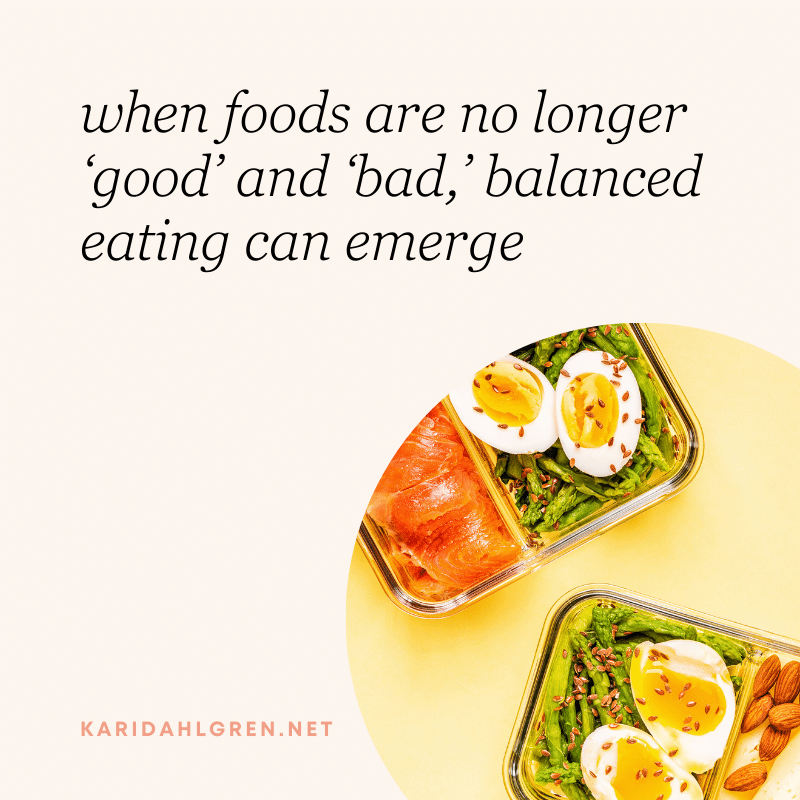
Food neutrality is about seeing all foods as equal, without attaching moral values to them, and that all foods really can fit into a balanced diet. To achieve this, start by recognizing the language you use around food. Instead of labeling foods as “good” or “bad,” describe them in terms of their taste, texture, or how they make you feel.
Sometimes, it can promote food neutrality to remember the counterproductive effect of the restrict-binge cycle. When a food like chocolate is labeled as bad and put off-limits, it increases your thoughts and desire for those foods.[1] In the long-run, dismantling the food labels can help you find more peace and balance around food.
2. Embrace Intuitive Eating
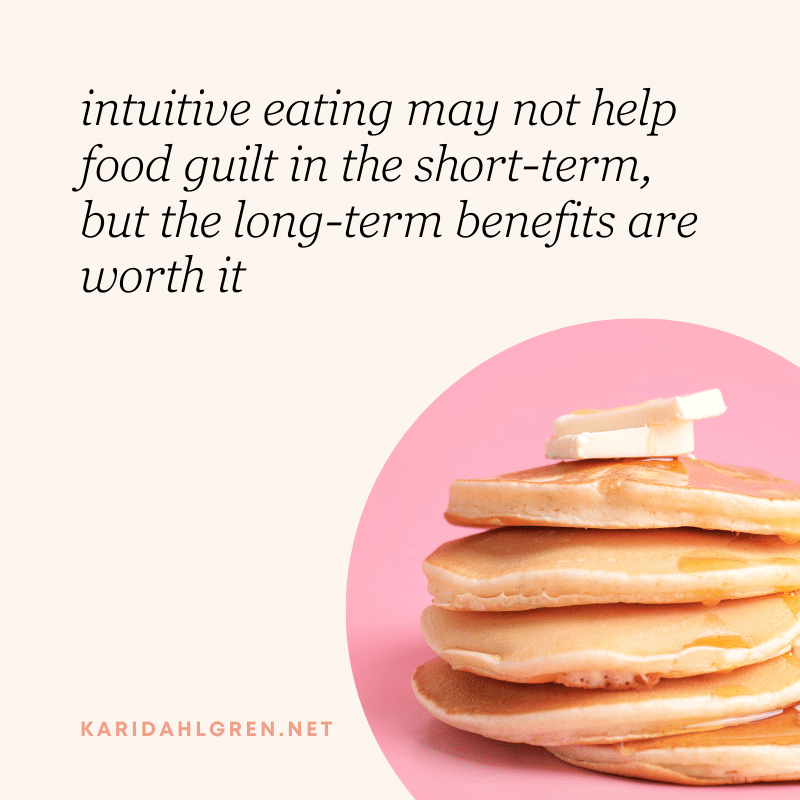
Intuitive eating encourages you to listen to your body’s hunger and fullness cues and to give yourself permission to eat the foods you love and crave. This promotes satisfaction with eating and greater weight stability than dieting[12], which can help ease food guilt because there’s no longer a need to regulate eating with external rules.
Interestingly, one study found that intuitive eating helped reduce weight-related shame but it did not have an impact on food guilt.[13] Drawing upon personal experience as someone that went through the stages of giving up dieting, it can take time to stop feeling guilty after eating when you embrace intuitive eating.
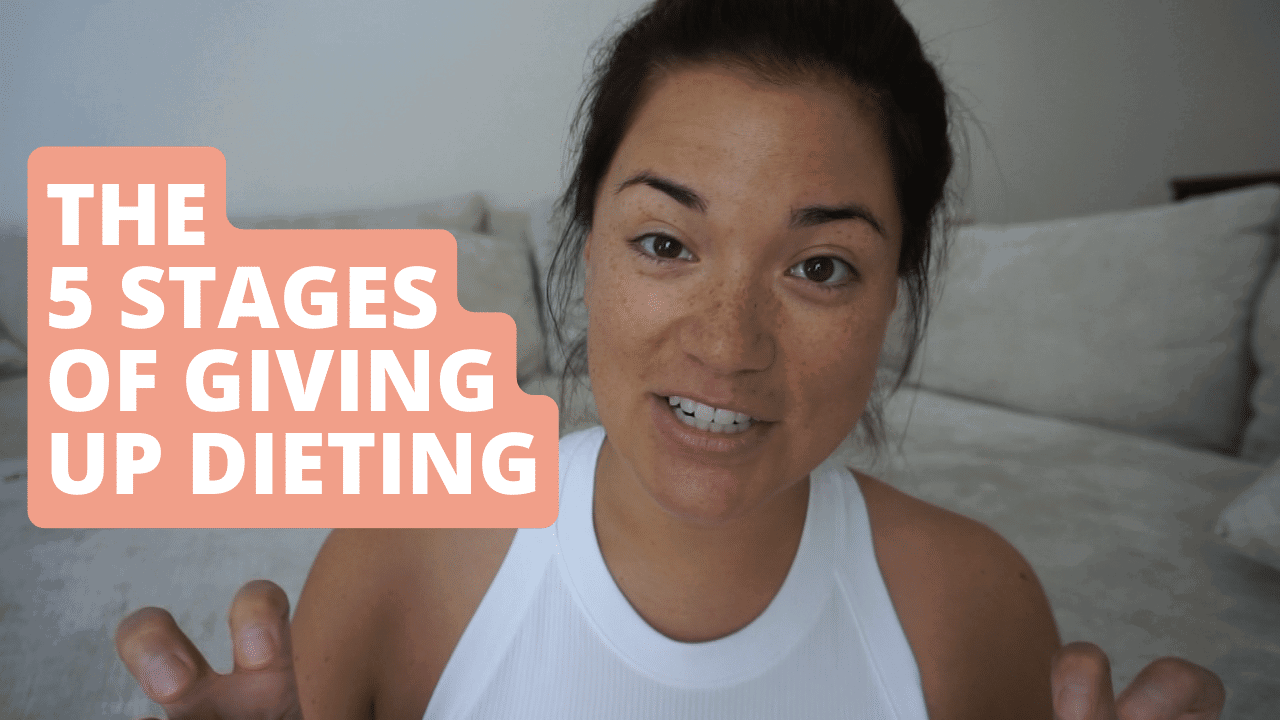
Don’t let slow progress stop you from giving intuitive eating a try, because it’s associated with a plethora of other benefits like better body satisfaction, improved psychological health, better eating habits and metabolic fitness—among many other benefits.[12]
3. Practice Body Acceptance
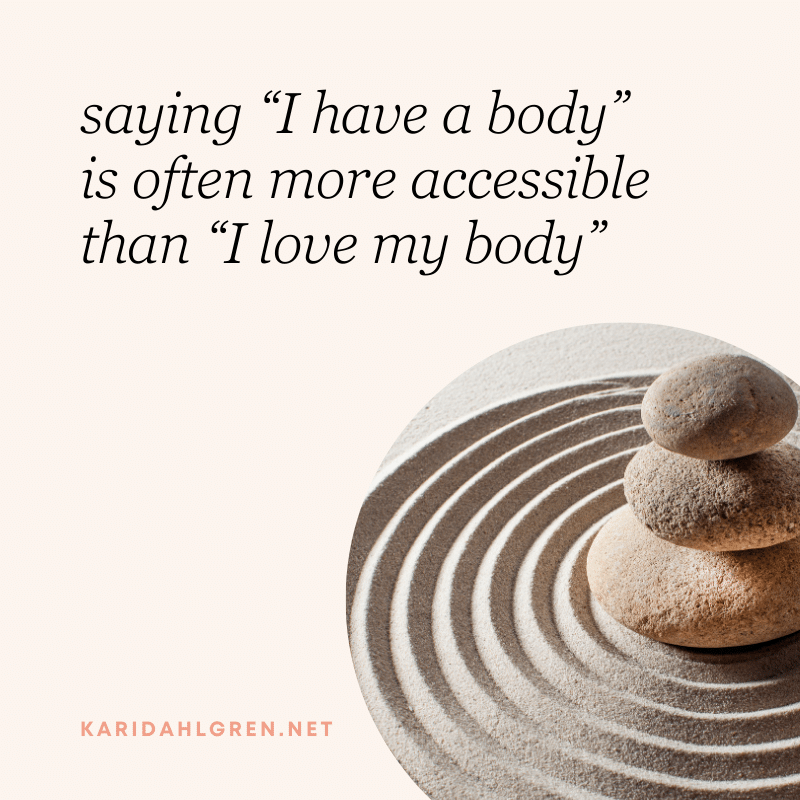
To break free from diet culture and overcome food guilt, focus on body acceptance—which is often a more accessible goal than body positivity. Especially for those struggling with frequently “feeling fat,” body positivity may feel too idealistic, whereas body acceptance emphasizes a realistic and compassionate approach to viewing your body.
While there’s a vicious cycle of restriction and binge eating, there’s another side of the coin: the virtuous cycle of giving up dieting and improved body image. In my work as an eating psychology coach, I’ve noticed that the act of giving up dieting often has an uplifting impact on body image.
When you stop beating yourself up for breaking self-imposed food rules, it gives you a chance to recover some of the confidence and self-esteem that was diminished by diet culture. Progress isn’t linear and there’s much more that goes into learning how to not feel guilty after eating, so let’s keep digging.
4. Try to Eat Mindfully
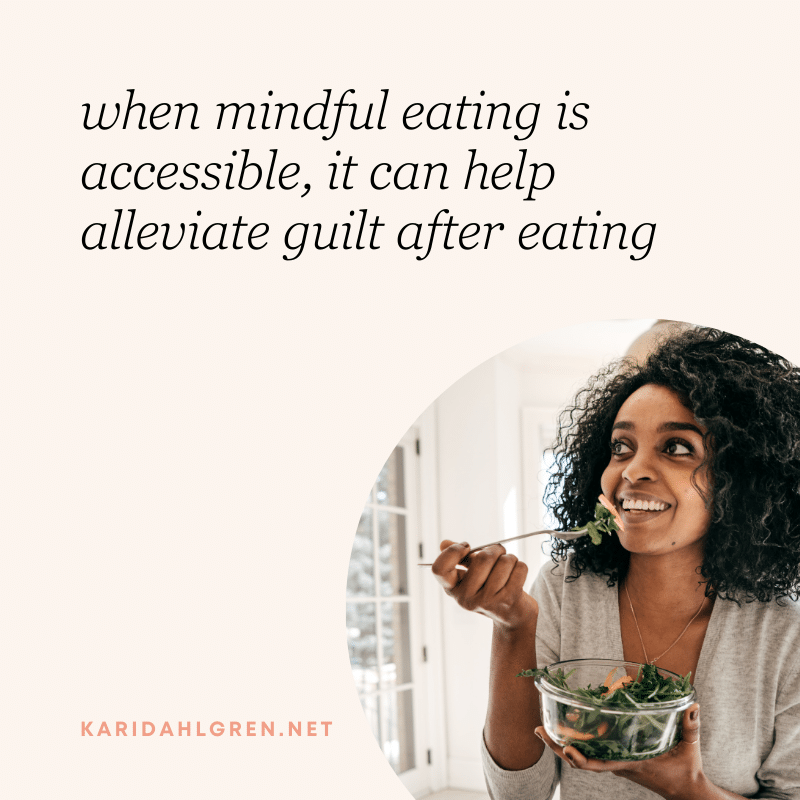
Mindful eating has been shown to significantly help reduce feelings of shame and guilt after eating.[14] To embrace mindful eating, focus on engaging all your senses while eating. Notice the colors, smells, textures, and flavors of your food. Take your time with each bite and try to eat without distractions like TV or your phone.
In my practice, I actually like to encourage mindful eating with a caveat: if mindful eating is inaccessible to you due to compulsive eating tendencies, try not to beat yourself up on the days where you eat while distracted. Mindful eating can be difficult for those in the grips of compulsion, and it’s important to avoid compounding food guilt with further self-criticism if mindful eating cannot be accomplished.
5. Use “Thought Swaps” to Enhance Self-Compassion When Feeling Guilty After Eating
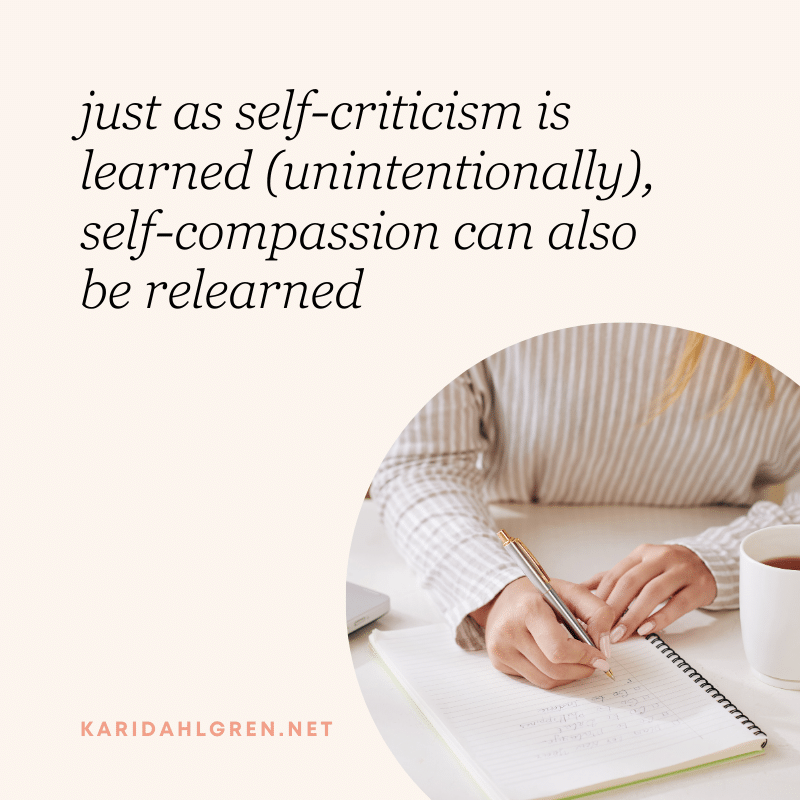
Many people that struggle with food guilt or compulsive eating are very nice towards others but are particularly critical of themselves. On that note, it’s no surprise that self-criticism is associated with heightened eating disorder pathology because it heightens feelings of shame.[15]
If you struggle with feeling guilty after eating, do what you can to reduce the “airtime” given to self-criticism. Each time you catch yourself thinking a self-critical thought, try to find a self-compassionate one. Your thoughts can be trained through repetition, and by repeating self-compassionate thoughts more frequently, you can help ease the inner critic.
For instance, if you notice a self-critical thought like, “I am gross for eating so much dessert,” try to follow that thought with something more compassionate like, “It’s understandable that I ate plenty of dessert given how long I used to deprive myself of it.” This can help train your thoughts towards self-compassion, which can have an uplifting impact on your relationship with food and yourself.
6. Seek Support in a Variety of Ways
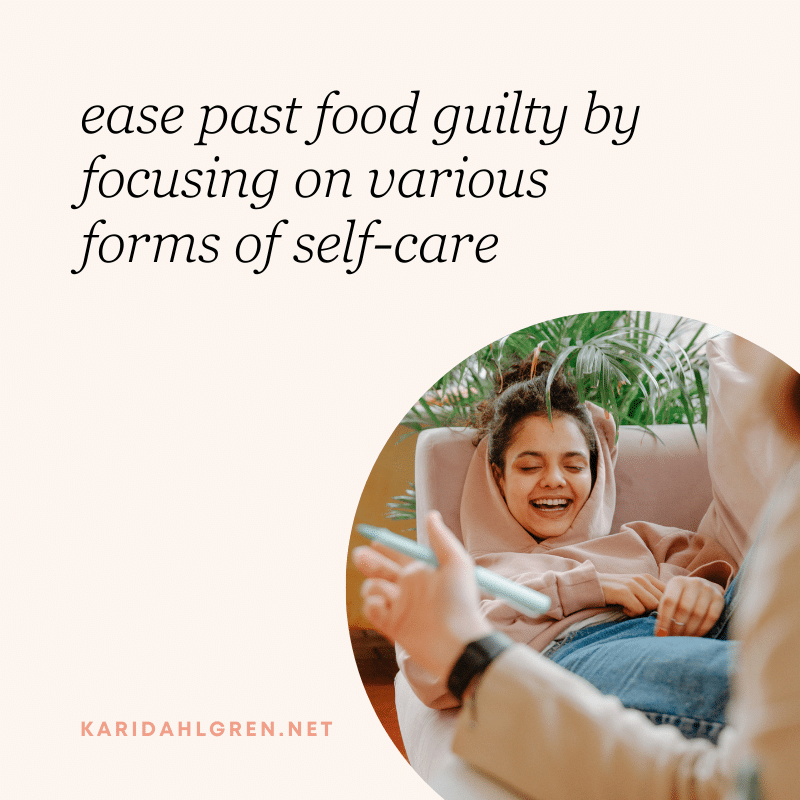
If you struggle with feeling guilty after eating, experiment with different forms of self-care until you find something that works for you. An important first step is working with any relevant medical professionals to assess for eating disorders or disordered eating, as these conditions often require specialized treatment.
Also consider exploring additional forms of self-care such as therapy and eating psychology coaching. Therapy provides a safe space to explore the underlying emotional and psychological factors contributing to food guilt. An eating psychology coach can help you understand the connection between your thoughts, feelings, and eating behaviors, guiding you towards a more balanced and mindful approach to eating.
Embracing Food Freedom Over Food Guilt
The journey to overcoming food guilt involves unlearning the restrictive narratives of diet culture and rediscovering the joy and freedom of eating without judgment. By embracing concepts like food neutrality, intuitive eating, and body acceptance, you can foster a healthier relationship with food and yourself.
Remember, progress is not linear and it’s okay to seek support along the way. The goal is to reach a place where food is no longer a source of guilt but a source of nourishment and pleasure. By taking steps to understand and address the question, “Why do I feel guilty after eating?” you can move towards a more balanced and fulfilling relationship with food—one where every meal is an opportunity for true nourishment and joy.




Thanks, Kari. I got your email and link to your blog at just the right time. With some recent weight gain, I’ve fallen back into old thinking habits and needed some reminders. Now re-reading the publications I got from you a few months ago. Looking forward to feeling free again. Thanks.
You are amazing Patsy! What you are going through is something that sooooo many people can relate to. I’m so glad you have my books to provide more insight, thanks for supporting them ^_^ xo